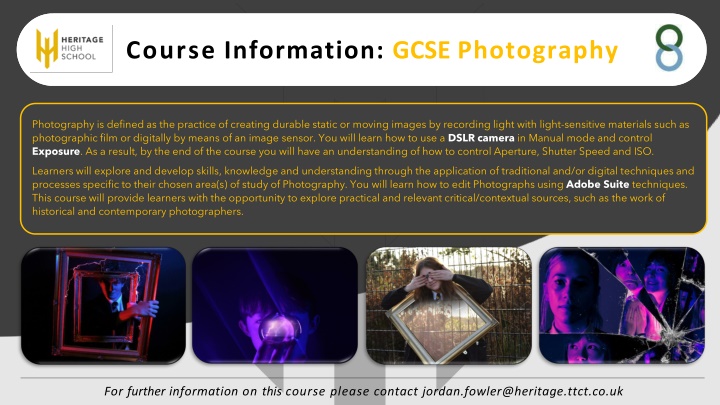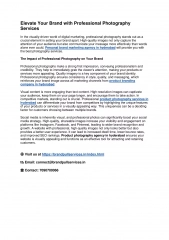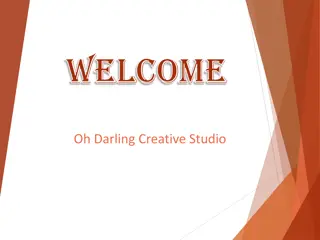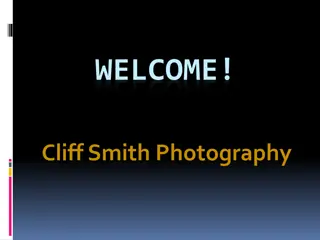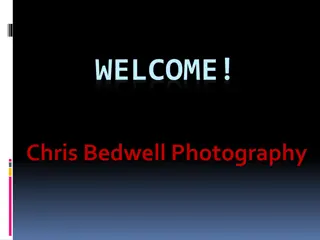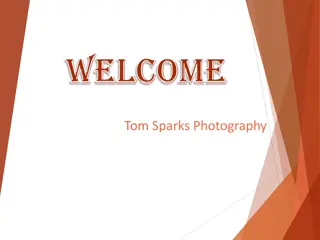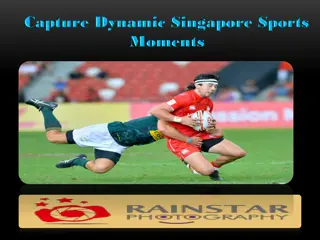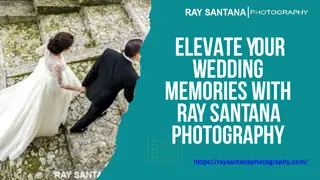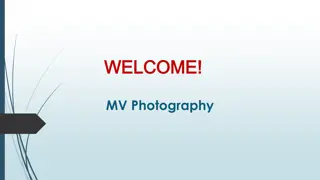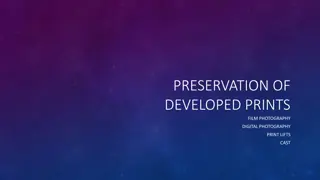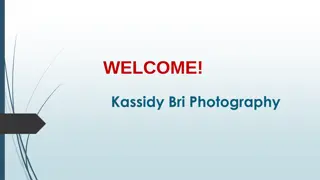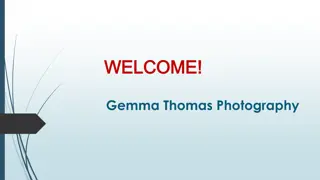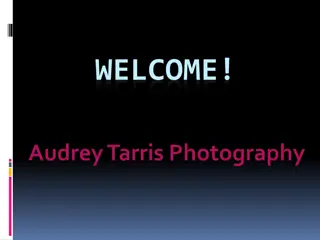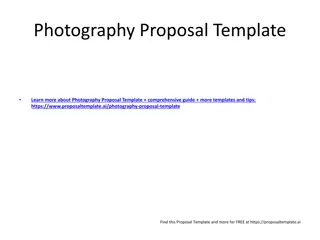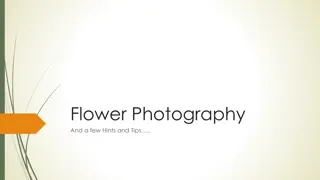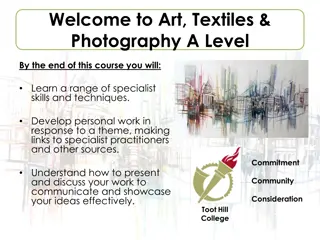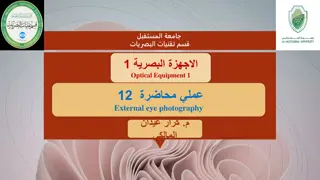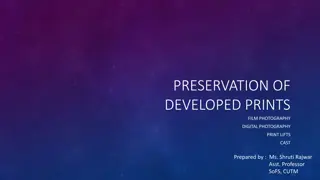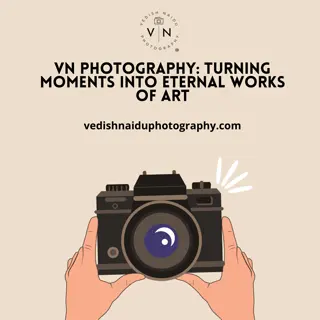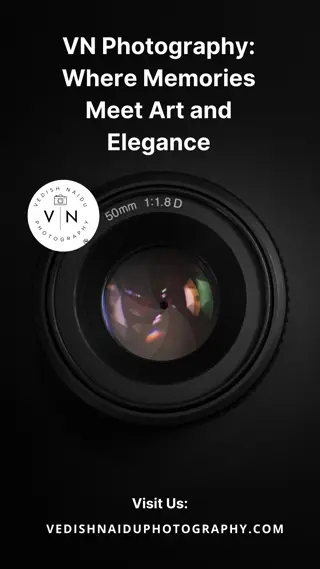GCSE Photography Course Overview and Skills Development
Explore GCSE Photography, where you will learn the art and techniques of creating images using light-sensitive materials or digital sensors. Gain skills in manual camera control, exposure, editing with Adobe Suite, and studying the work of photographers. The course includes two components for assessment, focusing on portfolio creation and responding to thematic assignments. Develop problem-solving, organizational, and creative skills essential for a career in the creative industries. Contact jordan.fowler@heritage.ttct.co.uk for more information.
Download Presentation

Please find below an Image/Link to download the presentation.
The content on the website is provided AS IS for your information and personal use only. It may not be sold, licensed, or shared on other websites without obtaining consent from the author.If you encounter any issues during the download, it is possible that the publisher has removed the file from their server.
You are allowed to download the files provided on this website for personal or commercial use, subject to the condition that they are used lawfully. All files are the property of their respective owners.
The content on the website is provided AS IS for your information and personal use only. It may not be sold, licensed, or shared on other websites without obtaining consent from the author.
E N D
Presentation Transcript
Course Information: GCSE Photography Photography is defined as the practice of creating durable static or moving images by recording light with light-sensitive materials such as photographic film or digitally by means of an image sensor. You will learn how to use a DSLR camera in Manual mode and control Exposure. As a result, by the end of the course you will have an understanding of how to control Aperture, Shutter Speed and ISO. Learners will explore and develop skills, knowledge and understanding through the application of traditional and/or digital techniques and processes specific to their chosen area(s) of study of Photography. You will learn how to edit Photographs using Adobe Suite techniques. This course will provide learners with the opportunity to explore practical and relevant critical/contextual sources, such as the work of historical and contemporary photographers. For further information on this course please contact jordan.fowler@heritage.ttct.co.uk
Assessment: GCSE Photography You will be assessed across two Components. Component 1 This is worth 60% of your overall qualification. You will produce a portfolio of work, which demonstrates a variety of skills and knowledge . In addition, you will demonstrate that you can work towards a theme, investigate the work of other artists, develop the use of media/techniques and then present a final response. Component 2 This is worth 40% of qualification. This section of the course is classed as the None Exam Assignment (NEA), which is split into two sections. Part 1:You will be given an assignment paper with 15 themes on from the 2nd of January in year 11. You must select one of these themes to respond to. You will then investigate appropriate artists and develop your own ideas in response to the theme. Part 2:You will then complete a 10-hour exam to create a final outcome/s. For further information on this course please contact jordan.fowler@heritage.ttct.co.uk
Dos and Donts: GCSE Photography Do s Don ts Pick this course because you have an interest in Photography and enjoy practical subjects Pick this course because you get on with the Teacher Pick this course if you want to develop your creativity, problem solving, analysis and evaluation skills Pick this course just because you might have a group of friends that will be picking it Pick this course if you have aspirations of working in the creative industries Pick this course if you think you will be just tsking selfies . Pick this course if you are willing to put the effort in, during class and at home Pick this course if you think it will be easy There are NO easy courses! For further information on this course please contact jordan.fowler@heritage.ttct.co.uk
Beyond Heritage: GCSE Photography Life/Employability Skills Problem solving- You will develop problem solving skills through your practice as a Photography student. For example, you will learn how to apply the correct manual settings on the DSLR camera to control exposure and movement effectively. Organisation- you will need to be able to prioritize workflow and meet strict deadlines, including fulfilling GCSE criteria. Creativity- You will respond to a selection of specific themes and produce a range of appropriate final outcomes. You will also learn how to present your portfolio in a professional and coherent manner. Discipline- You need to follow the teacher s expectations and respect the learning environment. This includes organising your time independently, using the equipment appropriately and behaving responsibly. For further information on this course please contact jordan.fowler@heritage.ttct.co.uk
Beyond Heritage: GCSE Photography Further Education Potential Career Pathways Photography (A-Level) Graphic Designer Advertisement and Product Marketing Games Development and Design (Level 3 Extended Diploma) TV, Broadcasting and Video Editor Freelance Wedding Photographer Journalism: Digital Broadcasting (Level 6 Degree) Commercial Photographer Architect Film and Digital Broadcast Production (A- Level) Film Set Designer Digital Design (Foundation Degree) Photojournalism Wedding Photographer Digital Design and Animation (Level 3 BTEC Extended Diploma) Press Photographer Film Editor Digital Marketing (Level 3 UAL Extended Diploma) For further information on this course please contact jordan.fowler@heritage.ttct.co.uk
